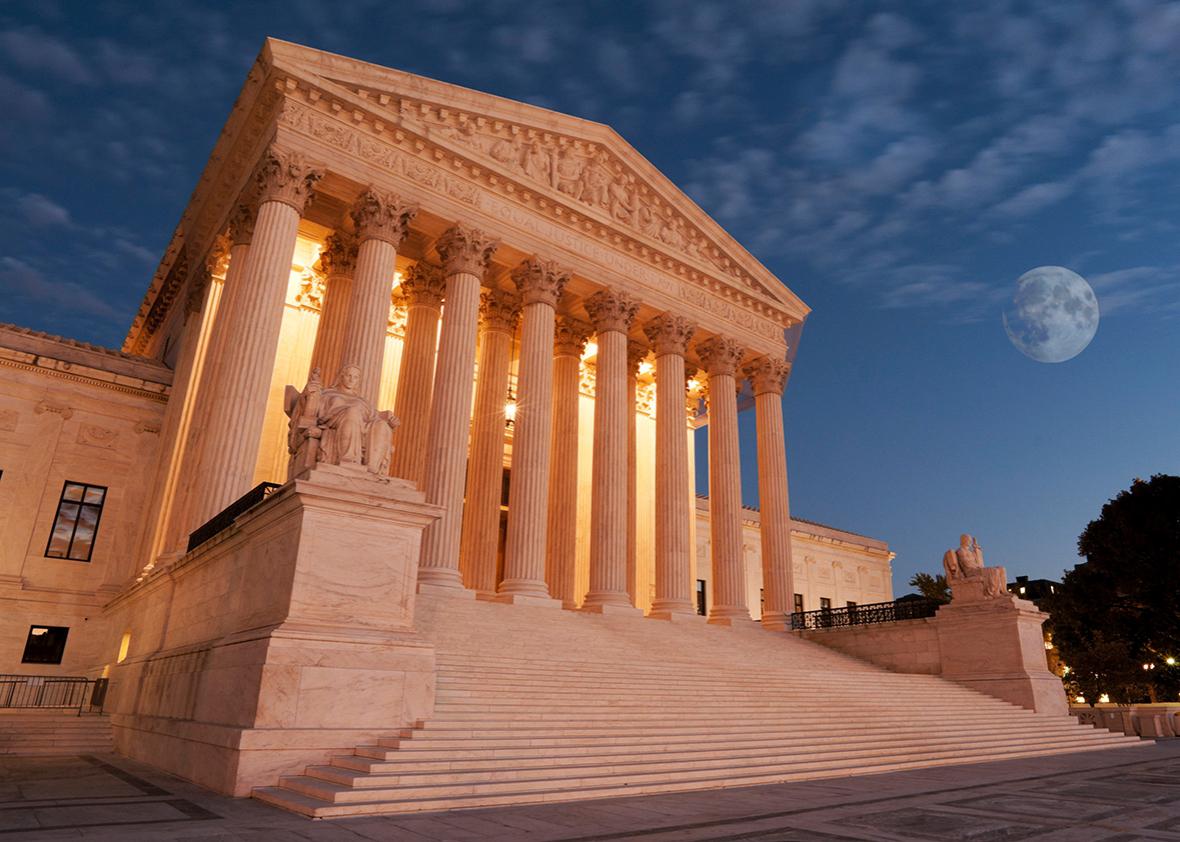Sitting in the press section at the Supreme Court this spring is a lot like sitting on the bridge of the Starship Enterprise when Captain Kirk has been forced to downgrade life support to minimum. Lights seem to flicker gently. Dazed reporters drift down the halls like tumbleweeds. On Tuesday, Justice Samuel Alito didn’t even show up for opinion announcements.
And when the sole opinion of the day was read from the bench, in a rollicking appeal about when an agency action is reviewable under the Administrative Procedure Act, in United States Army Corps of Engineers v. Hawkes Co. Inc., Chief Justice John Roberts read the unanimous opinion of the court with the affable charm of a man who has far too much time on his hands. With his trademark rhetorical flair the chief justice expounded joyously on the many charms of peat. (Whiskey! Fertilizer! “Structural support and moisture for smooth, stable greens that leave golfers with no one to blame but themselves for errant putts.”)
The court granted a single case, and issued warring opinions from weary jurists intent upon relitigating their longstanding death-penalty and jury-instruction disputes. Justice Clarence Thomas (joined by Justice Samuel Alito) wrote dutifully about the murder details in a jury instruction appeal, as he is more and more wont to do. (Hooker! Hunting knife! Bloodstained shoes! Depravity!) Justice Stephen Breyer (joined by Justice Ruth Bader Ginsburg) dissented in a death penalty appeal to remind us of the geographic disparities in capital sentences.
Both Justices Clarence Thomas and Samuel Alito appear to be spending the extra hours they might have spent actually being allowed to decide cases, in penning lurid slasher-type dissents. As my colleague Jess Bravin noted shortly after Justice Antonin Scalia died in February, these two justices seemed to be aligning in case after case, staking out the far right wing as Justice Anthony Kennedy and the chief justice are trying to forge consensus. Adam Liptak similarly observed this past weekend that Alito and Thomas wrote eight concurrences or dissents in 11 rulings handed down in late May, just as what he’s dubbed the new center of the court wrote almost none.
But it’s not just that Thomas and Alito are spending a lot of time writing true-crime concurrences and dissents; it’s also that there is a certain bored snappishness at work now. In one concurrence from last week Alito grouched that “the majority seems to agree that employees should promptly challenge the underlying discrimination … so why it disparages the idea elsewhere in its opinion … is beyond me.” Folks have started hurling the word “nonsense” around casually. In Tuesday’s brief, supposedly unanimous Army Corps of Engineers decision, three justices inked half-page concurrences, in which other justices sometimes joined, quite possibly just to evince signs of continued respiration from the bridge. Filing desultory half-page concurrences? It’s the new “busy.”
Sen. Mitch McConnell has been straining to characterize Merrick Garland as a crazed liberal, telling MSNBC on Tuesday, “from a conservative point of view, I don’t think you could have a worse nominee than Merrick Garland. There’s nothing about him that is moderate.”
It’s hard work not doing your job, Senate! But it’s even more challenging to wake up each morning and ensure that the high court can’t do its job either.
All of which brings us back to the great marble dustbowl that stands opposite the Capitol, and all the ways in which the justices who ostensibly work there have the look of resigned underemployment about them; a look that perhaps perfectly mirrors this moment in American history. Watching the justices assemble, dress, climb to their seats on the bench, and listen to the chief read out a unanimous opinion in a case about peat, it was clear that at least some of them might appreciate some interesting work until a ninth member is seated—work that might transcend halfhearted ideological infighting. I’m thinking they can maybe rent a bus and start a band. Or mow lawns or maybe babysit. But as the high court sputters along on its new screensaver mode, the fact that government can do next to nothing—even as there is more than ever to do—could not be more depressingly in evidence.
